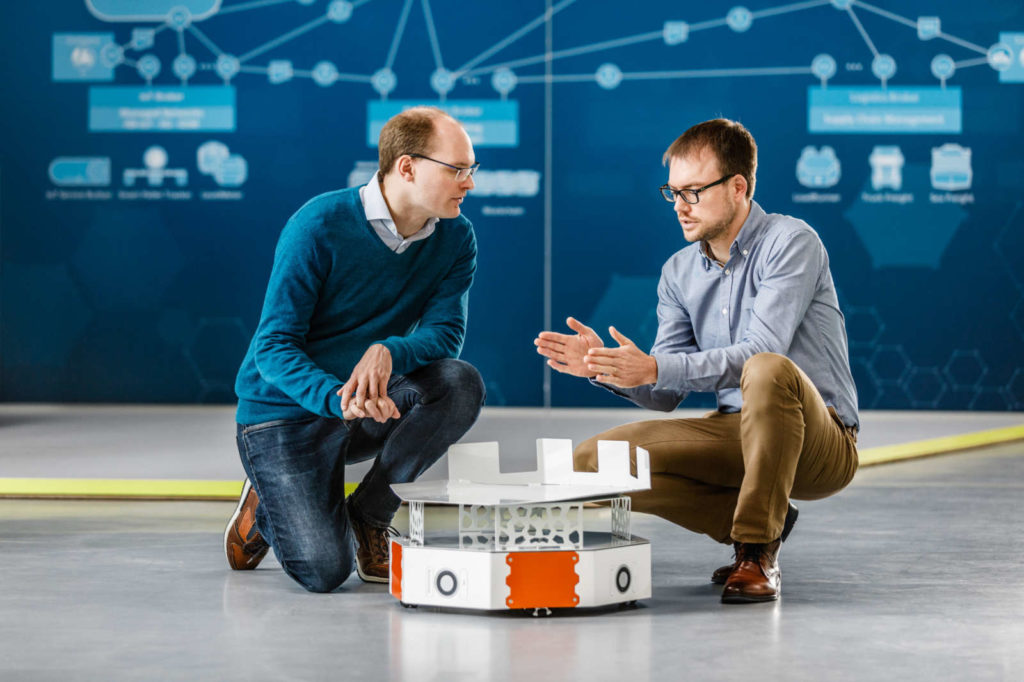Research clans rely even more on collaborative research and transfer
For the second funding phase, the Center of Excellence had called on researchers at the science location Dortmund to apply for admission to the research clans with creative and future-oriented projects - with great success.
We promote research and development work at the Dortmund location on high-impact topics.
The Center of Excellence Logistics and IT is currently in its third funding phase. Based on the Industry 4.0 expertise at the location, the stakeholders further developed forward-looking research topics within a clear thematic framework, set up roadmaps for the future and set the course for transfer. The current thematic focus is on the development of a »Center for Safety of Autonomous Systems in Logistics CeSaS«, driven by interdisciplinary research groups, the so-called research clans, in which various labs and test centers are being established.
Third funding phase
Autonomous logistic systems
Cognitive Ergonomics
Design of socio-technical systems

Autonomous logistic systems
In this research clan, the development of the infrastructure and the commissioning of the so-called PACE Lab are on the agenda. In der Testumgebung können innovative Verfahren zur Ortung und Lokalisierung im industriellen Maßstab agil entwickelt und validiert werden.
Participating institutions
Fraunhofer Institute for Material Flow and Logistics (IML)
Transfer paths
Contract research, infrastructure services
Contact person
 Dr.-Ing. Sören Kerner (PACE-Lab)
Dr.-Ing. Sören Kerner (PACE-Lab)Fraunhofer Institute for Material Flow and Logistics IML
+49 231 9743-170
soeren.kerner@iml.fraunhofer.de

Cognitive Ergonomics
The research clan focuses on the construction and operation of a picking lab with special consideration of the new aspects of safety, security and privacy.
Participating institutions
Fraunhofer Institute for Material Flow and Logistics (IML), Chair of Materials Handling and Warehousing and Chair of Industrial Information Management at TU Dortmund University, IfADo
Transfer paths
Contract research, transfer over heads, infrastructure services, scientific advisory services, active citizen involvement.
Contact person
 Veronika Kretschmer (Kommissionier-Testzentrum)
Veronika Kretschmer (Kommissionier-Testzentrum)
Fraunhofer Institute for Material Flow and Logistics IML
+49 231 9743-289
veronika.kretschmer@iml.fraunhofer.de

Design of socio-technical systems
This research clan is home to both an exoskeleton test center and the XR Lab for researching mixed reality applications.
Participating institutions
Fraunhofer Institute for Material Flow and Logistics (IML)
Transfer paths
Contract research, licensing, infrastructure services, scientific consulting services.
Contact person
 Semhar Kinne (Exoskelett-Testzentrum)
Semhar Kinne (Exoskelett-Testzentrum)
Fraunhofer Institute for Material Flow and Logistics IML
+49 231 9743-148
semhar.kinne@iml.fraunhofer.de

Christoph Schlüter (XR Lab)
Fraunhofer Institute for Material Flow and Logistics IML
+49 231 9743-293
christoph.schlueter@iml.fraunhofer.de
Machine Learning
PACE Lab
Picking Lab

Machine Learning
In the Research Clan, numerous different logistics use cases are processed in combination with machine learning.
Participating institutions
Fraunhofer Institute for Material Flow and Logistics (IML)
Transfer paths
Contract research, transfer over heads
Contact person
 Saskia Wagner-Sardesai
Saskia Wagner-Sardesai
Fraunhofer Institute for Material Flow and Logistics IML
+49 231 9743-196
saskia.sardesai@iml.fraunhofer.de

PACE Lab
The PACE Lab, whose construction and commissioning are being driven forward in the »Autonomous Logistics Systems« research clan, provides a test environment with real-time data acquisition and analysis of autonomous logistics systems such as drones or driverless transport systems.
Participating institutions
Fraunhofer Institute for Material Flow and Logistics (IML)
Transfer paths
Contract research, infrastructure services
Contact person
 Dr.-Ing. Sören Kerner
Dr.-Ing. Sören Kerner
Fraunhofer Institute for Material Flow and Logistics IML
+49 231 9743-170
soeren.kerner@iml.fraunhofer.de

Picking Lab
A new approach to ergonomics: In a picking lab, located at the research clan “Cognitive Ergonomics”, the chances of modern technologies for the design of workplaces in intralogistics are to be explored.
Participating institutions
Fraunhofer Institute for Material Flow and Logistics (IML), Chair of Materials Handling and Warehousing and Chair of Industrial Information Management at TU Dortmund University, IfADo
Transfer paths
Contract research, transfer over heads, infrastructure services, scientific advisory services, active citizen involvement.
Contact person
 Veronika Kretschmer
Veronika Kretschmer
Fraunhofer Institute for Material Flow and Logistics IML
+49 231 9743-289
veronika.kretschmer@iml.fraunhofer.de
Exoskeleton Test Center
XR Lab
Escape Room (learning location)

Exoskeleton Test Center
In the exoskeleton test center, which is being established in the research clan »Design of Sociotechnical Systems«, the potential of intelligent support structures for logistics as well as the prerequisites for their acceptance by humans are being researched.
Participating institutions
Fraunhofer Institute for Material Flow and Logistics (IML)
Transfer paths
Contract research, licensing, infrastructure services, scientific consulting services.
Contact person
 Semhar Kinne
Semhar Kinne
Fraunhofer Institute for Material Flow and Logistics IML
+49 231 9743-148
semhar.kinne@iml.fraunhofer.de

XR Lab
Which potentials arise for companies from Mixed Reality (XR) and which challenges have to be taken into account are being researched in the XR Lab of the research clan »Design of socio-technical systems«. Im Fokus stehen virtuelle Trainingsangebote, die sowohl Augmented Reality als auch Virtual Reality nutzen.
Participating institutions
Fraunhofer Institute for Material Flow and Logistics (IML)
Transfer paths
Contract research, licensing, infrastructure services, scientific consulting services.
Contact person
 Christoph Schlüter
Christoph Schlüter
Fraunhofer Institute for Material Flow and Logistics IML
+49 231 9743-293
christoph.schlueter@iml.fraunhofer.de

Escape Room (learning location)
The Escape Room at Fraunhofer IML, which was further developed within the framework of the Center of Excellence, is the didactic center of a continuing education program in blended learning format. It makes rather abstract topics and technologies related to logistics and supply chain management tangible and experienceable. Er macht eher abstrakte Themen und Technologien rund um Logistik und das Supply Chain Management anfassbar und erlebbar.
Participating institutions
Fraunhofer Institute for Material Flow and Logistics (IML), Chair of Materials Handling and Warehousing and Chair of Industrial Information Management at TU Dortmund University, IfADo
Transfer paths
Transfer über Köpfe, aktive Bürgereinbeziehung
Contact person
 Sandra Kaczmarek
Sandra KaczmarekFraunhofer Institute for Material Flow and Logistics IML
+49 231 755-6171
sandra.kaczmarek@iml.fraunhofer.de
Second funding phase
Applied cognitive ergonomics
Autonomous logistic systems
Digital Health Care

Applied cognitive ergonomics
The generalization of previous field and laboratory studies for transfer into practice. The corresponding implementation takes place in two complementary workstreams.
Participating institutions
Fraunhofer Institute for Material Flow and Logistics (IML)
Leibniz Institute for Work Research at the TU Dortmund (IfADo)
Chair of Materials Handling and Warehousing at TU Dortmund University (FLW)
Workstreams
Workstream 1: Cognitive ergonomics
Past and future questionnaire studies should be incorporated into a reliable database. This database contains relevant factors of logistics workplaces. In addition, the results are prepared e.g. for company comparisons. Moreover, a study is being conducted in the warehouse demonstrator on gait and behavior patterns when using different picking methods.
Workstream 2: Test center picking technologies
The experimental study is continued in a realistic dynamic picking environment. A demonstrator for the analysis and evaluation of different picking technologies will be built.
Participation opportunities
( following)
Publications
Plewan, T., Rinkenauer, G. (2020). Darbietung und räumliche Trennung von visuellen Doppelaufgaben im virtuellen 3D-Raum. In: Gesellschaft f+r Arbeitswissenschaft e.V., Dortmund (Hrsg.), Frühjahrskongress 2020 in Berlin: Digitaler Wandel, digitale Arbeit, digitaler Mensch? – Beitrag B. 1.4
Rinkenauer, G., Jost, J., Kirks, T., Chapman, S., Terharen, A. & Plewan, T. (2020). Theoretische Konzepte der Mensch-Roboter-Kollaboration. In: Gesellschaft für Arbeitswissenschaft e.V., Dortmund (Hrsg.), Frühjahrskongress 2020 in Berlin: Digitaler Wandel, digitale Arbeit, digitaler Mensch? – Beitrag B. 13.4
Reiser, J. E., Wascher, E., Rinkenauer, G., Arnau, S. (2020). Mobiles EEG in der freien Wildbahn – Erfassung psychischer Beanspruchung. In: Gesellschaft für Arbeitswissenschaft e.V., Dortmund (Hrsg.), Frühjahrskongress 2020 in Berlin: Digitaler Wandel, digitale Arbeit, digitaler Mensch? – Beitrag A. 6.4.
Kretschmer, V., Klöckner, S., Wolfgarten, B., Berner, R. (2020). Datenbrillen erobern die Logistik: Überprüfung von Augmented Reality – gestützter Kommissionierung in der Praxis. In: Gesellschaft für Arbeitswissenschaft e.V., Dortmund (Hrsg.), Frühjahrskongress 2020 in Berlin: Digitaler Wandel, digitale Arbeit, digitaler Mensch? – Beitrag C. 2.3.
Mättig, B., Klöcker, S., Kretschmer, V. (2020). Dynamische Pause: Potentiale und Realisierbarkeit einer Vitaldatenmessung zur Stressprävention aus Unternehmenssicht. In: Gesellschaft für Arbeitswissenschaft e.V., Dortmund (Hrsg.), Frühjahrskongress 2020 in Berlin: Digitaler Wandel, digitale Arbeit, digitaler Mensch? – Beitrag B. 6.3.
Contact person
 Dr. Gerhard Rinkenauer
Dr. Gerhard Rinkenauer
Leibniz Institute for Work Research at the TU Dortmund (IfADo)
+49 231 1084 374
rinkenauer@ifado.de

Applied cognitive ergonomics
The generalization of previous field and laboratory studies for transfer into practice. The corresponding implementation takes place in two complementary workstreams.
Participating institutions
Fraunhofer Institute for Material Flow and Logistics (IML)
Leibniz Institute for Work Research at the TU Dortmund (IfADo)
Chair of Materials Handling and Warehousing at TU Dortmund University (FLW)
Workstreams
Workstream 1: Cognitive ergonomics
Past and future questionnaire studies should be incorporated into a reliable database. This database contains relevant factors of logistics workplaces. In addition, the results are prepared e.g. for company comparisons. Moreover, a study is being conducted in the warehouse demonstrator on gait and behavior patterns when using different picking methods.
Workstream 2: Test center picking technologies
The experimental study is continued in a realistic dynamic picking environment. A demonstrator for the analysis and evaluation of different picking technologies will be built.
Participation opportunities
( following)
Publications
Plewan, T., Rinkenauer, G. (2020). Darbietung und räumliche Trennung von visuellen Doppelaufgaben im virtuellen 3D-Raum. In: Gesellschaft f+r Arbeitswissenschaft e.V., Dortmund (Hrsg.), Frühjahrskongress 2020 in Berlin: Digitaler Wandel, digitale Arbeit, digitaler Mensch? – Beitrag B. 1.4
Rinkenauer, G., Jost, J., Kirks, T., Chapman, S., Terharen, A. & Plewan, T. (2020). Theoretische Konzepte der Mensch-Roboter-Kollaboration. In: Gesellschaft für Arbeitswissenschaft e.V., Dortmund (Hrsg.), Frühjahrskongress 2020 in Berlin: Digitaler Wandel, digitale Arbeit, digitaler Mensch? – Beitrag B. 13.4
Reiser, J. E., Wascher, E., Rinkenauer, G., Arnau, S. (2020). Mobiles EEG in der freien Wildbahn – Erfassung psychischer Beanspruchung. In: Gesellschaft für Arbeitswissenschaft e.V., Dortmund (Hrsg.), Frühjahrskongress 2020 in Berlin: Digitaler Wandel, digitale Arbeit, digitaler Mensch? – Beitrag A. 6.4.
Kretschmer, V., Klöckner, S., Wolfgarten, B., Berner, R. (2020). Datenbrillen erobern die Logistik: Überprüfung von Augmented Reality – gestützter Kommissionierung in der Praxis. In: Gesellschaft für Arbeitswissenschaft e.V., Dortmund (Hrsg.), Frühjahrskongress 2020 in Berlin: Digitaler Wandel, digitale Arbeit, digitaler Mensch? – Beitrag C. 2.3.
Mättig, B., Klöcker, S., Kretschmer, V. (2020). Dynamische Pause: Potentiale und Realisierbarkeit einer Vitaldatenmessung zur Stressprävention aus Unternehmenssicht. In: Gesellschaft für Arbeitswissenschaft e.V., Dortmund (Hrsg.), Frühjahrskongress 2020 in Berlin: Digitaler Wandel, digitale Arbeit, digitaler Mensch? – Beitrag B. 6.3.
Contact person
 Dr. Gerhard Rinkenauer
Dr. Gerhard Rinkenauer
Leibniz Institute for Work Research at the TU Dortmund (IfADo)
+49 231 1084 374
rinkenauer@ifado.de

Autonomous logistic systems
Due to the increasing key role of intelligent and networked logistics systems, we deal with the management and control of independently acting elements in logistics systems.
Participating institutions
Fraunhofer Institute for Material Flow and Logistics (IML)
Leibniz Institute for Work Research at the TU Dortmund (IfADo)
Institute for Transport Logistics at the TU Dortmund University (ITL)
Chair of Materials Handling and Warehousing at TU Dortmund University (FLW)
Workstreams
Workstream 1: Autonomous multi-robot systems
Based on the testbeds for autonomous intralogistic transport systems, further sub-goals such as the evaluation of various algorithms from the fields of mapping and navigation are derived. The practical implementation of the theoretical principles developed so far in the field of communication in distributed systems also takes place in this workstream.
Workstream 2: AI for controlling logistics systems
We are concerned with the targeted use of large amounts of data in order to use the acquired information for intelligent algorithms in the planning and control of logistics systems. A future technology is the combination of methods of simulation and optimization with methods from the field of artificial intelligence and machine learning.
Workstream 3: Modelling of human behaviour in logistic systems
The goal of the workstream is the typologization of actors and the development of a software-based model object for mapping relevant behavioral aspects in logistics systems. This creates the basis for increasing the accuracy of the actors in the modelling of logistics systems, with their decisions and characteristics, in the future.
Workstream 4: IT for the Silicon Economy
The networking of research results from the areas of the social networked industry and the smart shop floor with the practical experience of the Fraunhofer IML with the knowledge from various IT and industry 4.0 studies takes place in this workstream. This creates the possibility of being able to offer a state-of-the-art range of services in the field of IT for the Silicon Economy in the future
Participation opportunities
For companies
Participation in research cooperations and transfer projects, here: Application of joint research projects or industrial research, preparation of studies for companies, e.g. planning support, simulation studies, IT selection for logistics and the development of control algorithms for driverless transport systems.
Companies can contribute to a better description of autonomous agents on a conceptual level in terms of currently used model parameters as well as in the validation and prototypical application and the subsequent evaluation with company-specific requirement profiles.
For science
Joint research within the scope of the Center of Excellence as associated partners, development of joint research ideas in the fields of driverless transport systems, AI and simulation, traffic modelling (especially driver behaviour and traffic behaviour) or IT for the Silicon Economy
We welcome offers of collaboration, meaningful critical and thoughtful suggestions and friendly exchange with scientific colleagues.
For students
Theses in the fields of intralogistics, transport logistics and transport systems, execution of or participation in case studies and business games, e.g. in the context of lectures or seminars.
Publications
Schmeltzpfenning, K., Fohrmann, T., Spee, D. (2020), “Wege in das digitalisierte Lager – Mit Warehouse IT die Transformation erfolgreich gestalten”, Huss Verlag, München.
Schmeltzpfenning, K., Krämer, B. (2019), “Innovative Warehouse-Management-Systeme im Kontext von Industrie 4.0.” In: ten Hompel, M., Vogel-Heuser, B., Bauernhansl, T. (eds) Handbuch Industrie 4.0. Springer Reference Technik. Springer Vieweg, Berlin, Heidelberg.
Kreuz, F., Rinkenauer, G., Dreger, F., Clausen, U., Stahn, N. (2020), “Einfluss von Fahrertypologien und Zuständen auf strategische Fahrentscheidungen und das Verkehrssystem Stadt im Wirtschaftsverkehr”, 12. Wissenschaftsforum Mobilität 2020, 18.06.2020, Duisburg (Abstract eingereicht, Fullpaper im Juli).
Clausen, u., Kirberg, M., Rassmann, H., Schaudt, S. und Welker, F. (2020), “Simulation – Based Reinforcement Learning: Learning and Evaluation of an Elevator Parking Strategy” in a Hospital Proceedings of the 2020 Winter Simulation Conference, 13. – 16. Dezember 2020, Orlando, Florida (Einreichung im April)
Contact person
 Moritz Pöting
Moritz Pöting
Institute for Transport Logistics at the TU Dortmund University (ITL)
+49 231 755 7334
poeting@itl.tu-dortmund.de

Digital Health Care
The identification of hospital processes and their degree of digitization as well as the derivation of measures for further digitization is carried out in this research clan, whereby the human-centered implementation of new control and communication concepts is in the foreground.
Participating institutions
Fraunhofer Institute for Material Flow and Logistics (IML)
Fraunhofer Institute for Software and Systems Engineering (ISST)
Leibniz Institute for Work Research at the TU Dortmund (IfADo)
Chair of Industrial Information Management at TU Dortmund University (IIM)
Workstreams
Workstream 1: Digital hospital processes
The survey concept developed in the first funding phase for the representation of digital maturity in hospitals is to be further developed in order to supplement measures for achieving a “next level” and to test them with regard to scalability.
Workstream 2: Social Networked Health
Using surgery logistics as an example, a criteria assessment and actual state analysis will be carried out and focal points of interaction will be included. From this, design variations of a control centre in the field of human-technology interaction are developed, tested and transferred for a demonstrator
Participation opportunities
For students
Theses on various topics in the field of digital health processes and modeling of digital maturity in the hospital environment.
For companies
Prototypical developments for company-specific use cases as well as collaborative design of human, digitally supported work environments in a medical context.
Publications
( following)
Contact person
 Anja Burmann
Anja Burmann
Fraunhofer Institute for Software and Systems Engineering (ISST)
+49 231 97677 435
anja.burmann@isst.fraunhofer.de
Business models & innovation transfer
Information Logistics
Machine Learning

Business models & innovation transfer
We support the other research clans and initiatives in the Ecosystem of the Center of Excellence in the exploitation of their technical developments and the development of competencies and methods for the transfer of innovation regarding new trends.
Participating institutions
Fraunhofer Institute for Material Flow and Logistics (IML)
Chair of Industrial Information Management at TU Dortmund University (IIM)
Chair of Corporate Logistics at TU Dortmund University (LFO)
Participation opportunities
For students
Supervision of Bachelor, Master and project work in the field of business model development and innovation management Practical work in cooperation with an industrial company is expressly desired.
For companies
Planning and implementation of workshops or projects based on a comprehensive offer portfolio. Conceptual design and implementation of novel workshop formats that are individually tailored to the needs of the company.
For science
Support in the exploitation and transfer of technical solutions into practice as well as the development of suitable business models; research cooperations in the field of business models; research cooperations in the field of business model development and innovation management. Application for joint research projects.
Publications
Henke, M.; Austerjost, M.; Michalik, A.; Große, N. (2020): Transformationsmanagement für die Smart Maintenance. In: Steven, M., Dörseln, J. N.: Smart Factory: Einsatzfaktoren -Technologie -Produkte, Kohlhammer Verlag, Stuttgart, ISBN 9783170364707, S. 191-208.
Reder, L.; Michalik, A.; Pott, C. (2019): Lean-Ansatz zur Geschäftsmodellentwicklung für smarte Produkt-Service-Systeme am Beispiel der Instandhaltung, in: Steven, M.; Grandjean, L. (Hrsg.): Marktchancen 4.0. Erkennen, entwickeln und umsetzen innovativer Geschäftsmodelle, Kohlhammer Verlag, S. 163-187.
Reder, L.; Michalik, A.; Pott, C (2019): Lean Approach to Business Model Development for Smart Product Service Systems Using the Example of Maintenance, Proceedings of the 50th Annual Conference of the Decision Sciences Institute DSI 2019, pp. 423-443.
Michalik, A.; Besenfelder, C.; Henke, M. (2019): Servitizationof Small-and Medium-Sized Manufacturing Enterprises: Facing Barriers through the Dortmund Management Model. In: 9th IFAC Conference on Manufacturing Modelling, Management and Control MIM 2019.
Michalik, A.; Förster, F.; Besenfelder, C. (2018): Datenbasierte Geschäftsmodelle –Weshalb es dabei nicht um noch mehr Daten geht. In: 35. Deutscher Logistik-Kongress, Kongressband, Bundesvereinigung Logistik (BVL), S. 325-344.
Michalik, A.; Möller, F.; Henke, M.; Otto, B. (2018): Towards utilizing Customer Data for Business Model Innovation: The Case of a German Manufacturer. In : 10th CIRP IPS² 2018.
Contact person
 Dr. Anke Wiezorrek
Dr. Anke Wiezorrek
Fraunhofer Institute for Material Flow and Logistics (IML)
+49 231 9743 686
anke.wiezorrek@iml.fraunhofer.de

Information Logistics
The subject of the research clan is the conceptualization and implementation of information logistics processes. Two workstreams map different use cases for this purpose.
Participating institutions
Fraunhofer Institute for Software and Systems Engineering (ISST)
Chair of Industrial Information Management at TU Dortmund University (IIM)
Workstreams
Workstream 1: Usage Control Policies in Data Ecosystems
The goal of the work stream is the visualization of usage control policies to be defined by a 3D printer. In the demonstrator a CAD file is sent from the owner to a recipient, the implemented policies are then represented by different filaments.
Workstream 2: Digital architectures in logistics
The use of data streams in the planning and optimization of systems and processes is examined in the workstream using a demonstrative IoT platform. The demonstrator “RIOTANA” serves as a study object for the role of digital twins, architectural layers and potential data sources in logistics.
Participation opportunities
For students
Supervision of final and project work in the fields of digital twins and data sovereignty
For companies
Cooperation in research collaborations; joint implementation of projects in the fields of digital twins and data sovereignty
Publications
( following)
Contact person
 Hendrik Haße
Hendrik Haße
Fraunhofer Institute for Software and Systems Engineering (ISST)
+49 231 976 77 423
hendrik.hasse@isst.fraunhofer.de

Machine Learning
We network users with researchers in the field of machine learning (ML) through different formats to increase ML usage for a better solution of practical tasks in logistics applications in companies or public institutions and their supply chains.
Participating institutions
Fraunhofer Institute for Material Flow and Logistics (IML)
Chair of Materials Handling and Warehousing at TU Dortmund University (FLW)
Fraunhofer Institute for Software and Systems Engineering (ISST)
Chair of Corporate Logistics (LFO)
Participation opportunities
For students
Work on topics from the field of machine learning in bachelor and master theses- An ML data mining competition is in preparation-
For science
Participation in the exchange with international scientists on the topic AI/ML in logistics.
For companies
Participation in events about possibilities and potentials of ML in logistics. Participation in a company survey on ML in logistics
Publications
Leveling, Jens:
KI im Mittelstand: Vom Hype zur Realität. Vortrag auf der EMPACK 2019, 08.05.2019, Dortmund
(Messe EMPACK <2019, Dortmund>)
2019
Leveling, Jens; Vogel, Maurice:
Künstliche Intelligenz in der Logistik: Vortrag gehalten bei den Hamburger Logistiktagen, 30.01.2019, Hamburg
(Hamburger Logistiktage <2019, Hamburg>)
2019
Leveling, Jens:
Künstliche Intelligenz in der Logistik. Was steht hinter dem Hype?: Vortrag gehalten beim Deutschen Logistik Kongress 2019, 25.10.2019, Berlin
(Deutscher Logistik Kongress <36, 2019, Berlin>)
2019
Leveling, Jens:
Neue Möglichkeiten durch Machine Learning: Vortrag gehalten auf dem Zukunftskongress Logistik, 37. Dortmunder Gespräche, 17.09.-18.09.2019, Dortmund
(Zukunftskongress Logistik <2019, Dortmund>)
2019
Moroff, Nikolas Ulrich; Sardesai, Saskia:
Machine learning in demand planning: Cross-industry overview
(Hamburg International Conference of Logistics (HICL) <2019, Hamburg>)
In: Kersten, W.: Artificial Intelligence and Digital Transformation in Supply Chain Management. Innovative Approaches for Supply Chains: Proceedings of the Hamburg International Conference of Logistics (HICL), 25-27 September 2019, Hamburg. Berlin: epubli, 2019. (Proceedings of the Hamburg International Conference of Logistics (HICL) 27), pp. 354-383
urn:nbn:de:gbv:830-882.054309
Murrenhoff, Anike:
Buzzword? Von wegen!: Maschinelles Lernen am Fraunhofer IML
In: Logistik entdecken, Vol.20 (2019), pp.14-17
Urbann, Oliver: Artificial Intelligence and Machine Learning in Logistics. Vortrag bei der PhD School of Logistics – Summer School 2019 July 8 – 12, Dortmund.
Urbann, Oliver; Menges, Dino; Schwarz, Ingmar; Tasse, Stefan; Stenzel, Jonas:
Camera Calibration for Color Classification
(Asia-Pacific Conference on Intelligent Robot Systems (ACIRS) <4, 2019, Nagoya>)
In: Institute of Electrical and Electronics Engineers -IEEE-: 4th Asia-Pacific Conference on Intelligent Robot Systems, ACIRS 2019: 13-15 July 2019, Nagoya, Japan. Piscataway, NJ: IEEE, 2019, pp. 118-123
Witthaut, Markus: Machine Learning and Data Analytics – Introduction on Tools and Methods. Vortrag bei der PhD School of Logistics – Summer School 2019 July 8 – 12, Dortmund.
Contact person
 Dr. Markus Witthaut
Dr. Markus Witthaut
Fraunhofer Institute for Material Flow and Logistics (IML)
+49 231 9743 450
markus.witthaut@iml.fraunhofer.de
Human-Technology Interaction
Software engineering in intralogistics

Human-Technology Interaction
The aim is to continue the work of the research clan of the same name of the first funding phase with the new focus on business model development for an expert system of human-technology interaction (MTI) and a demonstrator for the human agent. In addition to the physical level, for the first time the MTI will be examined on a virtual level.
Participating institutions
Fraunhofer Institute for Material Flow and Logistics (IML)
Fraunhofer Institute for Software and Systems Engineering (ISST)
Chair of Materials Handling and Warehousing at TU Dortmund University (FLW)
Leibniz Institute for Work Research at the TU Dortmund (IfADo)
Workstreams
Workstream 1: Design of socio-technical systems
Requirements for an expert system are derived, which serves as a decision basis for companies to use technologies for MTI. Furthermore, the integration of the human being into socio-technical systems is illuminated by the implementation of the human agent, a digital image of the human being, taking into account the individual needs of the human being.
Workstream 2: Virtual Reality
The already existing work with the focus on VR from different areas of the participating partners will be collected, analysed and uniformly combined in order to bundle resources and to be able to develop more effectively together. To this end, standardization concepts are developed and implemented in initial drafts.
Participation opportunities
For students
Studies on Human-Technology Interaction as well as Bachelor, Master and Project Theses
For science
Studies in the field of adaptive systems and contextual information representation and human-robot collaboration. Research collaborations for human-technology interaction.
For economy
Contract research in the field of human-robot interaction as well as conducting studies on human-robot collaboration.
Publications
Thomas Kirks, Jana Jost, Jan Finke, and Sebastian Hoose. Modelling proxemics for human-technology-interaction in decentralized social-robot-systems. In 3rd International Conference on Intelligent Human Systems Integration: Integrating People and Intelligent Systems. Springer, 2020
Benedikt Mättig, Thies Uwe Trapp, Alexander Sinsel, Jana Jost, and Thomas Kirks. Der Mensch in der Industrie – Innovative Unterstützung durch Augmented Reality, volume 3. Springer Vieweg, Berlin, Heidelberg, 2019.
Thomas Kirks, Tim Uhlott, and Jana Jost. The use of blockchain technology technology for private data handling for mobile agents in human-technology interaction. In 9th IEEE International Conference on Cybernetics and Intelligent Systems (CIS) and the 9th IEEE International Conference on Robotics, Automation and Mechatronics (RAM). 2019.
Thomas Kirks and Benedikt Mättig. Internet of resources – concept for an agent-based distributed resource management in the fourth industrial revolution. In 4th Asia-Pacific Conference on Intelligent Robot Systems, 2019.
Thomas Kirks, Jana Jost, Tim Uhlott, Julian Püth, and Matthias Jakobs. Evaluation of the application of smart glasses for decentralized control systems in logistics. In the 22st IEEE International Conference on Intelligent Transportation Systems. IEEE, 2019.
Thomas Kirks, Jana Jost, Tim Uhlott, and Soren Kerner. Concept and implementation of an adaptive decentralized control system for human-technology interaction. In 2019 IEEE 12th Conference on Service-Oriented Computing and Applications (SOCA), pages 127-132. IEEE, 11 2019.
Thomas Kirks, Jana Jost, and Tim Uhlott. Integrating humans in decentralized control systems with autonomous transport vehicles under the premise and use of proxemics distances. In Workshop on Research and Practice Challenges for Engineering Interactive Systems while Integrating Multiple Stakeholders Viewpoints. CEUR Workshop Proceedings, 2019.
Thomas Kirks, Jana jost, Jan Finke, and Preity Gupta. Follow me – collaboration between human workers and autonomous transport vehicles for better process integration. In 10th International Conference on Apllied Human Factors and Ergonomics. SPringer, 2019.
Thomas Kirks and Jana Jost. Integrating cps into socio-technical systems. In 4th Asia-Pacific Conference on Intelligent Robot Systems, 2019.
Jana Jost and Thomas Kirks. Mensch-Technik-Interaktion in Industrie 4.0 Umgebungen am Beispiel EMILI, volume 3. Springer Vieweg, Berlin, Heideberg, 2019.
Jana Jost and Thomas Kirks. A flexible interaction module for adaptive user control for autonomous transport vehicles. In International Conference on Intelligent Human Systems Integration: Integrating People and Intelligent Systems. Springer, 2019.
Peter Detzner, Jana Jost, and Thomas Kirks. A novel task language for natural interaction in human-robot systems for warehouse logistics. In IEEE International Conference on Computer Science and Education. IEEE, 2019.
Stuart Chapman, Jana Jost, Thomas Kirks, and Gerhard Rinkenauer. Examining the effects of height, velocity and emotional representation of a social transport robot and human factors in human-robot-collaboration. In 17th IFIP TC. 13 International Conference on Human-Computer Interaction 2019.
Contact person
Thomas Kirks
Fraunhofer Institute for Material Flow and Logistics (IML)
+49 231 9743 134
thomas.kirks@iml.fraunhofer.de

Software engineering in intralogistics
The Research Clan focuses on new concepts for the control and monitoring of intralogistic processes and autonomous robot systems using low code. Especially in times of limited availability of computer scientists, low codecan help companies to use employees more efficiently.
Participating institutions
Chair 14 for Software Engineering at TU Dortmund University (LS14)
Chair of Materials Handling and Warehousing at TU Dortmund University (FLW)
Participation opportunities
For students
Final and project work in the subject area
For companies
Cooperation for new applications
For science
Extension of the Open-Source software by own modules and extensions
Publications
( following)
Contact person
 Dr. Malte Mauritz
Dr. Malte Mauritz
Chair 14 for Software Engineering at TU Dortmund University (LS14)
+49 231 755 2707
malte.mauritz@tu-dortmund.de
First funding phase
Advanced Data Processing Technologies
Data Network Engineering
Digital Business Engineering

Advanced Data Processing Technologies
In this research clan, fundamental technologies and models for the use and processing of data concerning decision-relevant information in different business areas are explored, developed as prototypes and evaluated.
Participating institutions
Fraunhofer ISST (Digitization in Healthcare, Service Industries & Logistics)
Participation opportunities
For students
Theses on various topics (e.g. ChatBots, Remote Processing, Data Mining in medical records)
For companies
Prototypical developments (e.g. chatbots, remote processing) can be adapted and used for company-specific applications.
Especially for medical partners – context specific analyses of existing data sets and prototypical implementation of data processing components.
Publications
Frederik Möller; Markus Spiekermann; Anja Burmann; Heinrich Pettenpohl; Sven Wenzel: Future Challenges in Logistics and Supply Chain Management – Daten.Whitepaper
Jan Cirullies; Yevgen Pikus: Fit für die Digitalisierung – Chatbots sichern Anwendern den Zugriff auf die Cyber-Ebene. Konferenzbeitrag Materialflusskongress 201
Salima Houta; Anja Burmann; Bastian Braun: Einsatz von digitalen Biomarkern in der Praxis – Epilepsie-Anfallsdetektion und Parkinson-Früherkennung durch Smart-Data-Verfahren.Buchbeitrag Springer
Fabian Bruckner; Dominik Krüger; Ralf Nagel; Sven Wenzel; Boris Otto: Eine Programmiersprache zur souveränen Datenverarbeitung. Konferenzbeitrag DACH Security 2018
Contact person
 Anja Burmann
Anja Burmann
Fraunhofer Institute for Material Flow and Logistics IML
+49 231 97677 435
anja.burmann@isst.fraunhofer.de

Data Network Engineering
The core topic here is the analysis of so-called data supply chains. The focus is on the visualization of data supply chains. The aim is to provide solutions for the current challenges in the areas of transparency, data management, automation and profitability.
Participating institutions
Participation opportunities
For students
Bachelor’s and master’s theses can be written in computer science as well as in information logistics. Topics include data supply chain, data value chain, synthesis, evaluation of data, inventory of data, graphical models as well as domain-specific languages.
For companies and scientists
Research collaborations
Use cases for testing the developed methods and software from the field of data management in general and linking different data in particular.
Publications
Anja Burmann; Sven Wenzel; Heinrich Pettenpohl; Frederik Möller; Markus Spiekermann: Future Challenges in Logistics and Supply Chain Management – Daten. Whitepaper
Markus Spiekermann; Daniel Tebernum; Sven Wenzel; Boris Otto: A Metadata Model for Data Goods. MKWI 2018
Möller, F.; Spiekermann, M.; Burmann, A.; Pettenpohl, H.; Wenzel, S.: Bedeutung von Daten im Zeitalter der Digitalisierung. 2017
Contact person
 Heinrich Pettenpohl
Heinrich Pettenpohl
Fraunhofer Institute for Software and Systems Engineering ISST
+49 231 97677 321
heinrich.pettenpohl@isst.fraunhofer.de

Digital Business Engineering
Digital Business Engineering (DBE) is a new and cutting-edge approach to engineering digital business models that responds to the ever-increasing demands of enterprise digitalization. We develop the theoretical and methodical basis.
Participating institutions
TU Dortmund with the Chair of Industrial Information Management
Fraunhofer Institute for Software and Systems Engineering ISST
Participation opportunities
For companies
Planning and implementation of innovation workshops on the digitization of business models
Participation as practice partner for courses at the Chair of Industrial Information Management
For students
Supervision of bachelor’s and master’s theses in the field of digitization of business models with the Chair of Industrial Information Management
Publications
Möller, Frederik; Opriel, Sebastian; Hermann, Mario; Otto, Boris: Digital Business Engineering – Findings from the Install4Schenker Case. In: Multikonferenz Wirtschaftsinformatik (MKWI) 2018: Data driven X – Turning Data into Value, pp. 538-549
Michalik, Alexander; Möller, Frederik; Henke, Michael; Otto, Boris: Towards Utilizing Customer Data for Business Model Innovation – The Case of a German Manufacturer. In: Procedia CIRP 73, pp. 310-316
Möller, Frederik; Spiekermann, Markus; Pettenpohl, Heinrich; Burmann, Anja; Wenzel, Sven: Bedeutung von Daten im Zeitalter der Digitalisierung, Whitepaper
Contact person
 Frederik Möller
Frederik Möller
Chair of Industrial Information Management, TU Dortmund
+ 49 231 755 8313
frederik.moeller@tu-dortmund.de
Digital Processes
Cognitive Ergonomics
Machine Learning

Digital Processes
From the assessment of the maturity level to the implementation of Industry 4.0 scenarios: We develop a comprehensive approach for the management of autonomous processes, especially in manufacturing companies and hospitals.
Participating institutions
Fraunhofer Institute for Material Flow and Logistics IML
Fraunhofer Institute for Software and Systems Engineering ISST
TU Dortmund
Participation opportunities
For companies
Cooperation in research cooperations or joint implementation of studies
For students
Supervision of final theses
Publications
Schäfer, Tristan; Möller, Frederik; Burmann, Anja; Pikus, Yevgen; Weißenberg, Norbert; Hintze, Marcus; Rehof, Jakob: A methodology for combinatory process synthesis – Process variability in clinical pathways. In: International Symposium on Leveraging Applications of Formal Methods, Verification and Validation (ISoLA) 2018, Springer
Burmann, Anja: Buchbeitrag zum Thema Digital Health Maturity Index
Yevgen Pikus; Norbert Weissenberg; Bernhard Holtkamp and Boris Otto: Semi-Automatic Ontology-Driven Development Documentation. ACM/SIGAPP Symposium On Applied Computing (SAC) 2019; ACM
Contact person
 Hendrik Haße
Hendrik Haße
Fraunhofer Institute for Software and Systems Engineering ISST
+49 231 976 77 423
hendrik.hasse@isst.fraunhofer.de

Cognitive Ergonomics
On the basis of scientific measurement and evaluation methods we develop design criteria for systems in intralogistics and identify possibilities for optimising physical and mental stresses at work.
Participating institutions
Participation opportunities
For companies
Participation in a field study on cognitive ergonomics: We are looking for order pickers for a questionnaire-based survey.
For companies and scientists
Participation in a research cooperation “Simulation for monitoring of cognitive load and stress in the warehouse”.
Participation in research collaborations for technology or technology evaluation with regard to cognitive ergonomics
Besides
Participation in laboratory studies at the IfADo (mainly students and older people, 55-70 years)
Publications
Rinkenauer, G.; Kretschmer, V. & Kreutzfeldt, M.: Kognitive Ergonomie in der Intralogistik. In: Future Challenges in Logistics and Supply Chain Management (Vol. 2, pp. 1 – 13). Dortmund: Fraunhofer IML, 2017
Kreutzfeldt, Renker & Rinkenauer: The attentional perspective on smart devices – Empirical evidence for device-specific cognitive ergonomics. In: Rebelo F.; Soares M. (eds): Advances in Ergonomics in Design. AHFE 2018. Advances in Intelligent Systems and Computing, vol 777. Springer, Cham
Rinkenauer, Kreutzfeldt, Renker & Plewan: Kognitive Ergonomie in der Logistik, Soziologisches Arbeitspapier Nr. 55/201, 2018
Kretschmer, V. & Spee, S.: Kognitive Ergonomie. Der Mensch – eingebunden in die Logistik 4.0, München, HUSS-Verlag, 2018
V. Kretschmer; T. Plewan; G. Rinkenauer: B. Mättig: Smart Palletisation: Cognitive Ergonomics in Augmented Reality Based Palletising. In: W. Karwowski and T. Ahram (eds.): Intelligent Human Systems Integration, Advances in Intelligent Systems and Computing 722, 2018
Plewan, T.; Kretschmer, V. Mättig, B.; Rinkenauer, G.: Augmented Reality in der Logistik: Nutzerunterstützung beim Palettieren. In: Kretschmer, V. und Spee, D. (eds.): Kognitive Ergonomie – Der Mensch eingebunden in die Logistik 4.0. München: Huss-Verlag, 82-88, 2018
E. Wascher; J. Reiser; M. Pacharra; G. Rinkenauer: Potenzial mobiler Hirnaktivitätsmessung in der Intralogistik. In: D. Spee and V. Kretschmer (eds.): Kognitive Ergonomie – Der Mensch eingebunden in die Logistik 4.0. München: Huss-Verlag, 114-119, 2018
G. Rinkenauer & T. Plewan: Altersabhängige Gleichgewichtsregulation bei manuellen Tätigkeiten. In: D. Spee and V. Kretschmer (eds.): Kognitive Ergonomie – Der Mensch eingebunden in die Logistik 4.0. München: Huss-Verlag, 100-105, 2018
T. Plewan, G. Rinkenauer: Attentional capture within and between depth planes. In: Journal of Vision, 18, 458, 2018
Plewan, T. & Rinkenauer, G.: Influence of stereoscopic depth information on visual search. Cogn Process, 19 (Suppl 1), S. 67, 2018
G. Rinkenauer & T. Plewan: Altersabhängige Gleichgewichtsregulation bei manuellen Tätigkeiten in der Intralogistik. In: Kongress der Deutschen Gesellschaft für Psychologie <51, 2018, Frankfurt>, Goethe Universität Frankfurt, 2018
Rinkenauer, G.; Böckenkamp, A. & Weichert, F.: Man-Robot Collaboration in the Context of Industry 4.0 – Approach-Avoidance Tendencies as an Indicator for the Affective Quality of Interaction? In: Schlick et al. (eds): Advances in Ergonomic Design of Systems, Products and Processes (pp. 335 – 348). Berlin: Springer, 2017
Bachmann, D.; Weichert, F.; Rinkenauer, G.: Review of three-dimensional human-computer interaction with focus on the leap motion controller. In: Sensors 18: paper 2194 (39 pp), 2018
Kretschmer, V.; Eichler, A.; Rinkenauer, G.; Spee, D.: Focus on the human being – Cognitive Ergonomics. In: Intralogistics Logistics Journal: Proceedings 2017, 1-6
Rinkenauer, G.; Plewan, T.: Geschwindigkeits-Genauigkeitsabgleich und Körperhaltung: altersbedingte Unterschiede bei der Balancekontrolle. In: Soziotechnische Gestaltung des digitalen Wandels – kreativ, innovativ, sinnhaft: 63. Kongress der Gesellschaft für Arbeitswissenschaft, HNW Brugg-Windisch, Schweiz, 15.–17. Februar 2017 (S. Beitrag F.2.6 (6 S.)) / Schriftleitung: Matthias Jäger. Dortmund: GfA-Press, 2017
Renker, J.; Schlagkamp, S.; Rinkenauer, G.: Ein Fragebogen zur Erhebung des Nutzerverhaltens bei der Interaktion mit Rechnerclustern. In: Soziotechnische Gestaltung des digitalen Wandels – kreativ, innovativ, sinnhaft, 63. Kongress der Gesellschaft für Arbeitswissenschaft, HNW Brugg-Windisch, Schweiz, 15.–17. Februar 2017 (S. Beitrag F.1.17 (5 S.)) / Schriftleitung: Matthias Jäger. Dortmund: GfA-Press
Kretschmer, V.; Plewan, T.; Rinkenauer, G. & Maettig, B.: Smart Palletisation – Cognitive Ergonomics in Augmented Reality based Palletising. In: Karwowski, W.; Ahram, T. (eds.), Proceedings of the 1st International Conference on Intelligent Human Systems Integration (IHSI 2018): Integrating People and Intelligent Systems, January 7-9, 2018, Dubai, United Arab Emirates, pp. 355-360, Springer
Kretschmer, V.; Bedarf, F. M.; Spee, D. & Rinkenauer, G. (Hrsg.): Intralogistik 4.0 – Physische und psychische Belastungen in der Kommissionierung. In: Harth, V.; Heidrich J. (Hrsg.): Deutsche Gesellschaft für Arbeitsmedizin und Umweltmedizin e. V. (eds.), DGAUM Dokumentation der Vorträge und Poster, S. 383-384, 2017
Kretschmer, V.; Eichler, A.; Rinkenauer, G. & Spee, D.: Focus on the human being – Cognitive Ergonomics in intralogistics. In: Wissenschaftliche Gesellschaft für Technische Logistik e. V. WGTL (Hrsg): Tagungsband zum 13. Fachkolloquium 20. und 21. September 2017, Graz: Technische Universität Graz, S. 115-120
Kretschmer, V. (2017). Belastungsschwerpunkte von Erwerbstätigen in der Intralogistik. Sicher ist sicher – Fachzeitschrift für Sicherheitstechnik, Gesundheitsschutz und menschengerechte Arbeitsgestaltung, Vol. 12, 536-540
Kretschmer, V., Spee, D., Rinkenauer, G. (2017). Der Mensch im Fokus: Kognitive Ergonomie in der Intralogistik. In Fraunhofer-Institut für Materialfluss und Logistik IML (eds.), Jahresbericht 2016, Hamm: Griebsch & Rochol Druck GmbH, 60-61
Eichler, A., Mättig, B., Kretschmer, V. (2018). Digitale Assistenten in der Verpackungslogistik: Fokus auf physische Beanspruchungen. Forum Arbeitsphysiologie – 22. Symposium Arbeitsmedizin und Arbeitswissenschaft für Nachwuchswissenschaftler, 16.11.-18.11.18, Tübingen, S. 22, ISBN: 978-3-00-061446-0
Kretschmer, V., Schmidt, M., Schwede, Ch., Schäfer, S., Müller, G. (2018). Spielerisch zum Trainingserfolg: Evaluationsstudie eines PC-basierten Serious Games für die Verpackungslogistik bei DB Schenker. Logistics Journal: Proceedings, Vol. 2018
Kretschmer, V., Schmidt, M., Schwede, Ch., Schäfer, S., Müller, G. (2018). Spielerisch zum Trainingserfolg: Evaluationsstudie eines PC-basierten Serious Games für die Verpackungslogistik bei DB Schenker. In Tagungsband zum 14. Fachkolloquium 26.-27. September 2018, Wien: Technische Universität Wien, 279-286
Kretschmer, V., Schier, A., Mättig, B. (2018). Digitale Assistenten für die Verpackungslogistik: Studie zur Kognitiven Ergonomie unterschiedlicher digitaler Packanleitungen. In wt Werkstattstechnik online, Jahrgang 108, H. 7/8, 549-554
Kretschmer, V. (2018). Kognitive Ergonomie: Die Zusammenarbeit von Mensch und smarten Technologien gestalten. In Fraunhofer-Institut für Materialfluss und Logistik IML (eds.), Jahresbericht 2017, Hamm: Griebsch & Rochol Druck GmbH, 50-51
Kretschmer, V., Bedarf, F. M., Terharen, A. (2018). Virtual Training in der Intralogistik: Evaluation eines Virtual Reality-gestützten Serious Games eines Verpackungsarbeitsplatzes. In 64. GfA-Frühjahrskongress, 21.-23. Februar 2018, Frankfurt am Main, Dortmund: GfA-Press
Mättig, B., Kretschmer, V. (2018). Mit Sensorarmbändern Belastungen erkennen. In Wolf-Kluthausen, H. (ed.), Jahrbuch Logistik 2018. Korschenbroich: free beratung, 74-78
Hering, F., Kretschmer, V., Maettig, B. (2018). Evaluationsstudie zur Eignung verschiedener Assistenzsysteme beim manuellen Palettieren in der operativen Logistik. In 64. GfA-Frühjahrskongress, 21.-23. Februar 2018, Frankfurt am Main
Hering, F., Maettig, B., Kretschmer, V. (2018). Studie über den Einsatz unterschiedlicher Systeme zum manuellen Palettieren und deren Einfluss auf die kognitive Ergonomie hinsichtlich verschiedener Faktoren. In Deutsche Gesellschaft für Arbeitsmedizin und Umweltmedizin e.V. (eds.), 58. Wissenschaftliche Jahrestagung, München
Kretschmer, V., Terharen, A. (2019). Serious Games in Virtual Environments: Cognitive Ergonomic Trainings for Workplaces in Intralogistics. In I. L. Nunes (ed.), Advances in Human Factors and Systems Interaction. Proceedings of the AHFE 2018 International Conference on Human Factors and Systems Interaction, July 21-25, 2018, Loews Sapphire Falls Resort at Universal Studios, Orlando, Florida, USA, Springer, 266-274
Mättig, B., Döltgen, M., Archut, D., Kretschmer, V. (2019). Intelligent Work Stress Monitoring: Prevention of Work-related Stress with the Help of Physiological Data Measured by a Sensor Wristband. Proceedings of the Intelligent Systems Conference (IntelliSys 2018), September 6-7, London, UK, IEEE, 1304-1309
Contact person
 PD Dr. Gerhard Rinkenauer
PD Dr. Gerhard Rinkenauer
Leibniz Institute for Work Research at the TU Dortmund (IfADo)
+ 49 231 1084 374
rinkenauer@ifado.de

Machine Learning
Machine learning is the basic technology for all applications that rely on artificial intelligence. We consolidate the areas of application and the methods and technologies used in the field of machine learning in logistics and develop them further.
Participating institutions
Fraunhofer Institute for Material Flow and Logistics IML
TU Dortmund with the Chair of Materials Handling and Warehousing
Fraunhofer Institute for Software and Systems Engineering ISST
Participation opportunities
For students
Processing topics from the field of machine learning in bachelor and master theses
For scientists
Participation in the PhD School of the Graduate School of Logistics, where a session is organized by the Machine Learning research clan
Publications
(following)
Contact person
 Anike Murrenhoff
Anike Murrenhoff
Fraunhofer Institute for Material Flow and Logistics IML
+49 231 9743 202
anike.murrenhoff@iml.fraunhofer.de
Human-Technology Interaction
Multi Agent Systems
Optimizing and simulating logistic networks

Human-Technology Interaction
In logistics, interaction between humans and machines is an important component of today’s systems. We derive the fundamental functions of the new human-machine interaction in the areas of adaptive user interfaces and systems, workplace design and context-related information visualization and then continue to develop them.
Participating institutions
Fraunhofer-Institut für Materialfluss und Logistik IML
TU Dortmund with the Chair of Materials Handling and Warehousing
Participation opportunities
For students
Final theses on all aspects of human-technology interaction
For business and science
Studies in the field of adaptive systems and context-related information representations
Research cooperations for human-technology interaction
Publications
Terharen A.; Feldmann F.; Reining C.; ten Hompel M.: Integration von Virtual Reality und optischem Motion Capturing in die Planung und Optimierung von Materialflusssystemen. In: Logistics Journal: Proceedings, Vol. 2018.
Kretschmer, V.; Terharen, A.: Serious Games in Virtual Environments – Cognitive Ergonomic Trainings for Workplaces in Intralogistics. In: Ahram T. (eds) Advances in Human Factors in Wearable Technologies and Game Design. AHFE 2018. Advances in Intelligent Systems and Computing, vol. 795. Springer, Cham
J. Jost; T. Kirks; M. Fiolka; S. Chapman: Sociotechnical Design of Industrial Transport Vehicle and its Interaction with Humans in Manufacturing Systems. In: Applied Human Factors and Ergonomics Conference, 2018
J. Jost; T. Kirks: Herausforderungen der Mensch-Technik-Interaktion in der Intralogistik. In: Future Challenges in Logistics and Supply Chain Management, 2018
S. Chapman; T. Kirks; J. Jost: Intuitive User-Centered Interaction Design for ATV. In: International Working Conference on Human-Centered Software Engineering, 2018
S. Chapman; T. Kirks; J. Jost: Study on Interaction Modalities between Humans and CPS in Sociotechnical Systems. In: International Conference on Human Systems Engineering and Design, 2018
Contact person
 Thomas Kirks
Thomas Kirks
Fraunhofer Institute for Material Flow and Logistics IML
+49 231 9743 134
thomas.kirks@iml.fraunhofer.de

Multi Agent Systems
Multi agent systems have long been part of the research landscape, but there are still specific questions. We consider architectural patterns, real-time debugging and self-X functions and thus the key factors for future decentralized controls of material flow systems and supply chains.
Participating institutions
Fraunhofer Institute for Material Flow and Logistics IML
TU Dortmund with the Chair of Materials Handling and Storage FLW
Participation opportunities
Currently none
Publications
Christian Blesing; Dennis Lünsch; Jonas Stenzel; Benjamin Korth: Concept of a Multi-agent Based Decentralized Production System for the Automotive Industry, PAAMS 2017
Deep Reinforcement Learning for Mobile Robot Navigation (Master-Thesis)
Automatische Streckennetzgenerierung für mobile Roboter unter größtmöglicher Freiflächenausnutzung von Belegtheitskarten (Bachelor-Thesis)
Contact person
 Christian Blesing
Christian BlesingFraunhofer Institute for Material Flow and Logistics IML
+49 231 9743 143
christian.blesing@iml.fraunhofer.de

Optimizing and simulating logistic networks
Through the combined use of optimization and simulation methods, complex logistics systems can be planned and controlled more effectively. The aim is to ensure resource-efficient operations based on well-founded decisions.
Participating institutions
TU Dortmund with the Institute for Transport Logistics
Participation opportunities
For companies
Participation in research cooperations and transfer projects, here: applications for joint research projects or industrial research
Preparation of studies for companies, e.g. planning support, simulation studies
For scientists
Joint research in the Center of Excellence Logistics and IT as associated partners
For students
Final theses in the fields of optimization, simulation and transport logistics
Carrying out or participating in case studies and business games, e.g. within the framework of lectures or seminars
Publications
Besenfelder, C.; Brüggenolte, M.; Austerjost, M.; Kämmerling, N.; Pöting, M.; Schwede, C.; Schellert, M.: Paradigmenwechsel in der Planung und Steuerung von Wertschöpfungsnetzen. Schriftenreihe Future Challenges in Logistics and Supply Chain Management. Ausgabe 5. Fraunhofer Publishing, 2018, DOI: 10.24406/IML-N-462117
Poeting, M.; Schaudt, S. und Clausen, U.: Simulation of an Optimized Last Mile Parcel Delivery Network involving Delivery Robots. In: Clausen, U.; Langkau, S. und Kreuz, F. (Hrsg): Advances in Production, Logistics and Traffic – Proceedings of the 4th Interdisciplinary Conference on Production, Logistics and Traffic 2019, Springer, Heidelberg et al. (Status: Accepted).
Clausen, U.; Brueggenolte, M.; Kirberg, M.; Besenfelder, C.; Poeting, M. and Gueller, M.: Agent-Based Simulation in Logistics and Supply Chain Research: Literature Review and Analysis. In: Clausen, U.; Langkau, S. und Kreuz, F. (Hrsg): Advances in Production, Logistics and Traffic – Proceedings of the 4th Interdisciplinary Conference on Production, Logistics and Traffic 2019, Springer, Heidelberg et al. (Status: Accepted).
Contact person
 Moritz Pöting
Moritz PötingInstitute for Transport Logistics, TU Dortmund
+49 231 755 7334
poeting@itl.tu-dortmund.de
Virtual and simulative models

Virtual and simulative models
Autonomous cyber-physical systems are increasingly used in inventory management. Using empirical case data, we develop the necessary methods and tools to determine their conditions of use and to evaluate their benefits.
Participating institutions
Fraunhofer Institute for Material Flow and Logistics IML
Participation opportunities
For companies
Participation in new research projects with industrial application cases within the scope of inventory management as well as in the field of maturity and benefit assessments for autonomous systems in logistics
For scientists
Practically oriented guest lecturers
For students
Participation in special courses in the field of corporate logistics
Supervision of project, bachelor and master theses
Publications
Uwe Clausen; Matthias Brüggenolte; Marc Kirberg; Christoph Besenfelder; Moritz Pöting; Mustafa Güller: Agent-Based Simulation in Logistics and Supply Chain Research. Literature Review and Analysis: 4th Interdisciplinary Conference on Production, Logistics and Traffic (ICPLT), 2018
Matthias Brüggenolte; Markus Stute; Christoph Besenfelder: Entwurf eines Reifegradmodells zur Integration von Business Analytics im Bestandsmanagement. In: Logistics Journal, Vol. 2018
Christoph Besenfelder; Matthias Brüggenolte; Maximilian Austerjost; Nicolas Kämmerling; Moritz Pöting; Christian Schwede; Maximilian Schellert: Paradigmenwechsel der Planung und Steuerung von Wertschöpfungsnetzen, Whitepaper, veröffentlicht von Fraunhofer IML, 2018
Contact person
 Matthias Brüggenolte
Matthias BrüggenolteChair of Corporate Logistics, TU Dortmund
+49 231 231 755 5712
brueggenolte@lfo.tu-dortmund.de
Contact
c/o Fraunhofer-Institut für Materialfluss und Logistik IML
Joseph-von-Fraunhofer-Straße 2–4 | 44227 Dortmund

 Dr. Ing. Benedikt Mättig
Dr. Ing. Benedikt Mättig Maik Hausmann
Maik Hausmann Dr. Ing. Hendrik Haße
Dr. Ing. Hendrik Haße